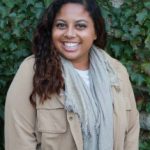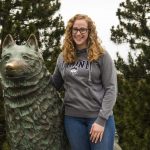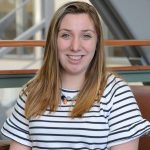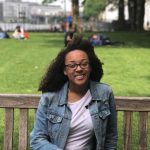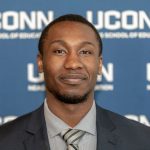LinkedIn (Alumna Lisbeth Dizney writes piece on using crime scene investigations as a tool in the classroom)
Spring 2019: Retiree Announcements and Faculty Appointments
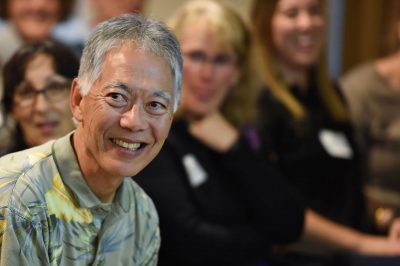
This spring, two longtime faculty members will retire from the Neag School’s Department of Educational Psychology and Department of Curriculum and Instruction. In addition, new heads have been named to the Department of Educational Psychology as well as the Teacher Education program for the fall of 2019.
PBIS Expert Sugai Retires
George Sugai, the Neag School’s Carole J. Neag Endowed Chair in Behavioral Disorders since 2005, retired on May 1 after serving for nearly 14 years at the Neag School. One of the nation’s leading authorities on behavioral disorders, positive behavioral interventions and supports (PBIS), classroom management, and special education, Sugai secured more than 20 funded projects totaling tens of millions of dollars over the course of his tenure at UConn.
He has taught special education courses at the graduate level; has presented at local, national, and international conferences and professional meetings; and has served as an advisor to the U.S. Departments of Education, Justice, and Health and Human Services. His work includes projects in Jamaica, Cayman Islands, New Zealand, Netherlands, Australia, Spain, and Canada, and invitations to present in Japan, England, Netherlands, Germany, and Denmark.
“Professor George Sugai retires from UConn having left an indelible mark on the field of education as one of the prime leaders of PBIS.”
— Board of Trustees Distinguished Professor Scott Brown on Professor George Sugai
Former director of the Center for Behavioral Education and Research (CBER) at UConn, Sugai founded the Center, which was approved by the UConn Board of Trustees in 2006. Its mission has been to promote equity and improve educational outcomes for all learners, especially those with, or at risk for, learning and behavioral difficulties, with research efforts focused on four key areas: literacy; positive behavior supports; behavioral health and school climate; and transition and postsecondary education. Since its inception, CBER has secured $55 million in federal and state research grants and contracts, and has engaged schools in all 50 states and 20 countries.
Sugai also is co-director of the widely respected Center for Positive Behavioral Interventions and Supports, funded by the U.S. Department of Education’s Office of Special Education Programs and the Office of Elementary and Secondary Education. The Center seeks to improve social, emotional, and academic outcomes for all students, including students with disabilities and students from underrepresented groups.
He earned his M.Ed. in 1974 and his Ph.D. in special education in 1980 from the University of Washington.
“Professor George Sugai retires from UConn having left an indelible mark on the field of education as one of the prime leaders of PBIS, who has prepared thousands educators across the globe to use evidence-based practices to directly impact students by encouraging prosocial behavior, improving academic performance, and promoting positive school cultures,” says Board of Trustees Distinguished Professor Scott Brown, head of the Department of Educational Psychology. “His PBIS framework is a signature component of preparing Neag preservice teachers for our nation’ schools, having been presented at the White House and at international conferences across the globe.”
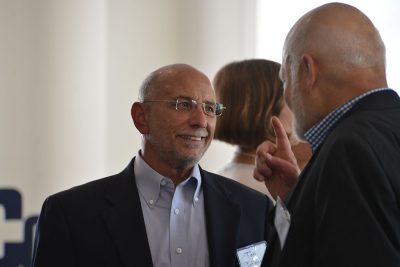
DeFranco to Retire After Nearly 28 Years at UConn
In addition, Thomas DeFranco, professor of mathematics education in the Department of Curriculum and Instruction with a joint appointment in the College of Liberal Arts and Sciences, will retire on June 1 after serving at for nearly 28 years at UConn.
Arriving at UConn in August of 1991, Defranco earned one of the University’s highest honors in 2001 when he was named as a University Teaching Fellow. In 2008, he received a Teaching Innovation Award from the UConn chapter of the American Association of University Professors (AAUP). He has served in numerous leadership capacities at the Neag School, including as director of teacher education, as associate dean, and, from 2009 to 2014, as dean.
With nearly $900,000 in funded projects, DeFranco’s research has focused on mathematical problem solving and on teaching and learning of mathematics. He also is credited with co-developing an innovative proposal for improving teacher preparation, which resulted in the Neag School’s landing the Teachers for a New Era project, a major initiative and grant from the Carnegie Corporation of New York. He served as co-director the Center for Research in Mathematics Education.
“We are richer for the legacy he leaves us all.”
— Neag Endowed Professor Suzanne Wilson on Dean Emeritus Thomas DeFranco
DeFranco earned his Ph.D. at New York University in 1987 and began his career in teaching at the elementary and secondary school levels. He also taught mathematics at St. John’s University on Staten Island and mathematics education at the University of Hartford.
“Professor Tom DeFranco known for his passion in teaching UConn students in his calculus classes retires after more than 27 years teaching and leading at UConn,” adds Brown. “Dr. DeFranco, a former dean of the Neag School of Education, will be remembered for his bold cluster hire initiative in which he hired 22 faculty in two years to address the achievement gap in Connecticut’s schools, reinforcing the leadership position of the Neag School of Education for many years to come.”
At the Neag School’s end-of-year faculty-staff meeting in May, Suzanne Wilson, Neag Endowed Professor of Teacher Education and head of the Department of Curriculum and Instruction, offered insight into DeFranco’s legacy as well. “He’s a man with a huge heart,” she said.
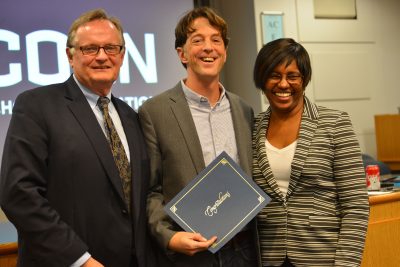
“Over his career, he did everything this institution asked him to do: raised research money, established scholarships, served his department, School, and University, and taught,” she added. “We are richer for the legacy he leaves us all.”
Coyne Named EPSY Department Head
Meanwhile, Brown will step down from his position as head of the Department of Educational Psychology as of June 22. An internationally recognized expert in learning and cognitive processing, Brown was appointed department head in 2017 by Dean Gladis Kersaint.
Professor Michael Coyne will succeed him as department head this August. Coyne, who currently serves as co-director of the Center for Behavioral Education and Research (CBER) and coordinator of the Neag School’s special education program, is an expert in reading instruction and intervention, effective practices for students with learning disabilities, and language and vocabulary learning.
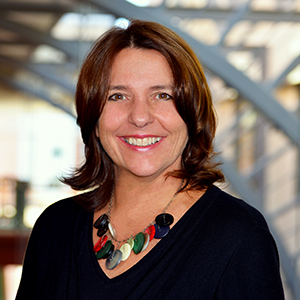
“I am grateful to Scott for his service, positive energy, and the sense of commitment he brought to his role as the educational psychology department head through the first few years of my deanship here in the Neag School,” Dean Kersaint says. “We are delighted to have Mike, another renowned scholar, with expertise in special education, to carry the torch forward for our EPSY programs.”
Femc-Bagwell to Lead Teacher Education Program
Effective Aug. 23, Michele Femc-Bagwell, associate professor-in-residence, will begin serving as director of the Neag School’s Teacher Education program as René Roselle steps down. Femc-Bagwell, who arrived at the Neag School in 2005, has a Ph.D. in educational administration from UConn.
Her educational experiences include teaching and school leadership positions in traditional and nontraditional public schools and higher education settings. She is a former secondary school English teacher, middle school assistant principal, and principal of one of Connecticut’s first charter schools. She also has served as the director of the University of Connecticut Administrator Preparation Program (UCAPP) and of the CommPACT Community Schools Collaborative.
Related Stories:
Young Inventors Converge on Campus
UConn Today (Neag School partnership with youth convention mentioned)
Hartford Schoolchildren Enjoy ‘UConn Day’
UConn Today (Neag School partner Kennelly School celebrates UConn as well as the Neag School student-teachers and alumni)
STEM-Focused, Prank-Loving School in Maine is No. 2 in the Nation
Boston Globe (Professor Casey Cobb quoted)
Hartford Schoolchildren Enjoy ‘UConn Day’
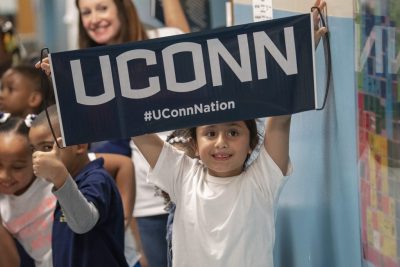
Editor’s Note: The following piece was originally published in UConn Today.
E.B. Kennelly School in Hartford, Conn., hosted the second annual “UConn Day” at the school on May 2, an event that included a schoolwide parade and a basketball game with students playing against the teachers and staff.
The idea for “UConn Day” came from the Neag School of Education’s 2018 graduating interns after a brainstorming session to identify an activity to drive student excitement about college, and to end the school year on a celebratory note.
“Our UConn students are a special part of the Kennelly staff,” says June Cahill ’93 (ED), ’94 MA, and school principal. “This high-energy event allows our students and staff to celebrate the partnership. With the college year ending in early May, our students often have a difficult time separating and saying ‘goodbye.’ This allows us to end the year in a positive way.”
The Kennelly School has enjoyed a longstanding partnership with UConn’s Neag School of Education, in which UConn education students in the Integrated Bachelor’s/Master’s program get hands-on experience through student teaching and internship opportunities during the school year. In 2016, this partnership was honored as a national model with the National Network for Educational Renewal’s Richard W. Clark Exemplary Partner School Award, which recognized the strengths of this collaboration.

In addition to the parade and basketball game, Kennelly students also participated in a service learning project to support HuskyTHON, UConn’s fundraising initiative for the Connecticut Children’s Medical Center.
Kennelly’s schoolwide motto is “Be the Change.” Students are given opportunities to be a part of effecting change, and this year, coins were collected in each classroom and donated to this cause. The winning class received UConn Dairy Bar ice cream and attended the basketball game.
Every year, Kennelly receives a critical mass of education students from the Neag School. All 650 Kennelly students are impacted by the juniors, senior student teachers, and master’s year interns, who work closely with them through intervention groups, tutoring, service learning projects, as well as student leadership opportunities. UConn Day was developed to recognize the partnership and give the children a chance to celebrate the University’s impact.
Kennelly is a Positive Behavioral Interventions and Supports (PBIS) school, where students are rewarded for good choices. “Bee” bucks are awarded for the three BEES (be safe, be respectful, be responsible). Students that showed outstanding effort in this area were rewarded with a “Golden Bee Buck,” which was their ticket to the basketball game, providing an incentive for all students. In addition, all Hartford Public Schools support college and career readiness opportunities. The partnership with UConn allows elementary and middle school students firsthand access to college students, encouraging them to view college as a realistic goal.
Check out the gallery of photos from Kennelly School’s 2019 UConn Day on Facebook.
Sandra Chafouleas Receives Award for Mentorship
UConn Today (Sandra Chafouleas honored by UConn chapter of AAUP)
Neag School Class of 2019 Featured
UCAPP Student Project Strives to Build a Sense of Belonging
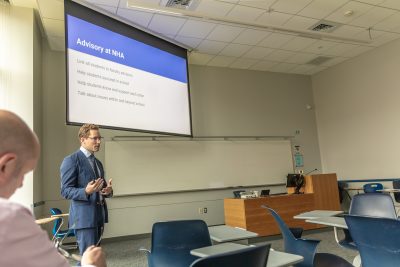
Over the past academic year, Neag School graduate student and high school English teacher Leszek Ward studied the effectiveness of regularly bringing small groups of students together with faculty advisors during homeroom at New Haven Academy, to determine whether implementing a structured protocol across certain groups would increase students’ sense of belonging.
Ward’s project won second place for the Lynn Hall Teacher Action Research Prize, an award which led him to discuss his work during the networking expo at the Yale School of Management Education Leadership Conference held in New Haven, Conn., in April.
Ward is a student in the University of Connecticut Administrator Preparation Program (UCAPP), a program within the Neag School that aims to prepare highly qualified school leaders to serve school communities across the state of Connecticut. UCAPP culminates in a capstone project, referred to as the change project, that allows students to take what they have learned through coursework to identify a need for change in schools and lead real-world improvement work.
UCAPP culminates in a capstone project, referred to as the change project, that allows students to take what they have learned through coursework to identify a need for change in schools and lead real-world improvement work.
Taking Steps to Foster Connectedness
Ward is in his 11th year of teaching at New Haven Academy, an interdistrict magnet school that serves 300 students from grades 9 through 12. New Haven Academy prides itself on being a school learning community where all members, including staff, students, and parents, know each other well, but Ward wanted to take this idea to the next level.
Ward focused his UCAPP change project on what are known as “advisory groups” — small groups of students, each led by a faculty advisor, which meet for 10 minutes in homeroom at the start of each school day and for 30-minute advisory sessions twice a week.
“These groups are meant to be a student’s ‘school family,’ a place where they are known and supported by at least one adult in the building, as well as a group of peers,” states Ward in his change project report.
Through an initial round of surveys, however, Ward and a group of seven fellow teachers found that these advisory groups were not doing enough to foster a sense of connectedness between students and their faculty advisors.
Ward says he chose advisory groups as the focus of his project because these groups already met consistently and because implementing a common homeroom protocol among certain groups was a small, manageable change that could potentially have a greater outside impact.
“We came up with the protocol by sharing our own experiences in advisory,” Ward says. “We also tried to look at a few other schools, read a chapter of The Culture Code by Daniel Coyle, and put all those different learning experiences together.”
The homeroom protocol, which was implemented across eight advisory groups, included the following steps:
- Greet advisees at the door (to personally welcome them to school)
- Ask students to put away their phones/headphones (to encourage conversation)
- Control seating so that students were in closer physical proximity (to build intimacy)
- Play music as students enter the room (to set a positive, cheerful tone)
- Facilitate a structured check-in (to ensure that each student was seen and heard)
While there were some limitations to implementing the protocol, including issues with students’ homeroom attendance and inconsistency in administrating each element of the protocol, the project ultimately showed an increase in the sense of belonging among students in the advisory groups that used the new, structured protocol.
Students’ sense of belonging was measured through an eight-question, schoolwide survey that was developed by Ward and administered three times over the course of the academic year: in September, November, and February. With the survey, Ward calculated an average “connected score” for each advisory group, comparing this score among the eight groups that underwent the protocol with the 11 groups that did not use the protocol. He found that the structured homeroom protocol had a positive effect, one that proved to be statistically significant, on students’ sense of belonging.
Ward’s interest in developing a sense of belonging at New Haven Academy stems from a body of existing research on the topic, including a 2007 study by Laura D. Pittman and Adeya Richmond that showed a sense of belonging is powerful enough to affect students even after they leave high school.
Celebrating the UCAPP Journey
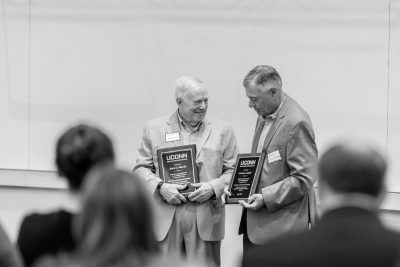
Director of the Educational Leadership Preparation Programs at UConn’s Neag School, Richard Gonzales, says students administering their change projects often find additional organizational issues in the school community that they have to tackle.
“There’s always the original topic and original issue of improvement, but one of the things that most students learn is there is always a lot more that comes from just getting started, rolling up your sleeves, and taking on improvement work,” says Gonzales. “There are other things that surface that are also important and that people also work on.”
UCAPP students presented their change projects at the UConn Storrs campus on April 27 during the program’s 5th Annual Change Project Day.
“Change Project Day is the celebration of their journey, where they come together as a community of school leader practitioners,” says Gonzales. “They present to one another and talk about not only what improvement work that they led, but most importantly the things that they learned about leadership, about leading change, about facilitating work with others, and what they learned about themselves as leaders.”
For Ward, the UCAPP change project meshed well with his day-to-day work at New Haven Academy. “My experience with the change project fits in really nicely with the work I was doing at my school,” he says. “It provided me with an opportunity to tackle an issue that I care about and that is important to my school.”
Check out photos from the Change Project Day. Learn more about the UConn Administrator Preparation Program (UCAPP) at ucapp.education.uconn.edu.
UConn to Offer Degree in Sign Language
The Day (UConn is working on a partnership with the Neag School to offer degree in sign language)
